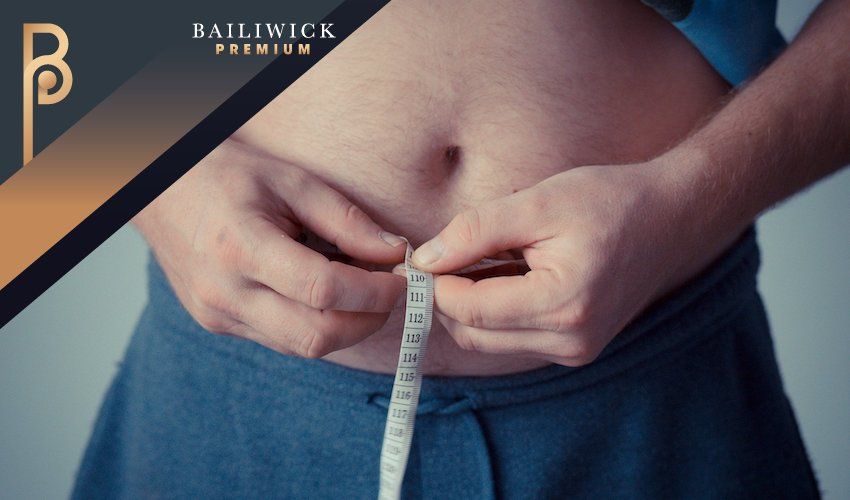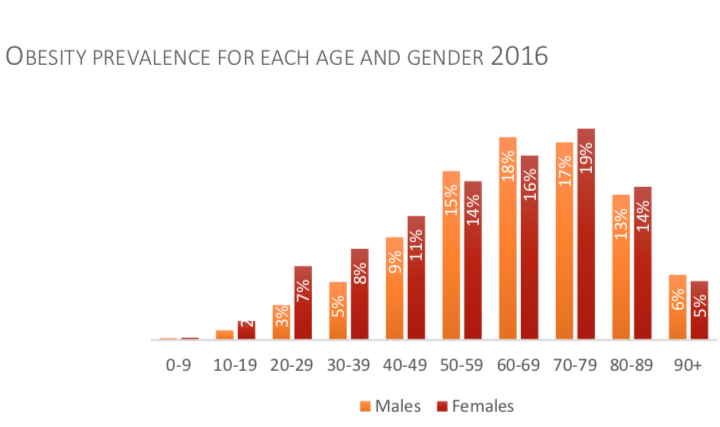


It’s a condition linked to 6,000 hospital admissions over the past three years and one that costs twice as much to treat than to prevent.
Obesity is putting a strain on Jersey’s health service and is expected to continue to do so if the Government doesn’t act, with the number of islanders overweight or obese set to increase by 28% by 2036.
Given the links with conditions ranging from heart disease and stroke to high blood pressure, diabetes, arthritis, respiratory problems (such as increased vulnerability to covid), and even some cancers, encouraging islanders into healthier lifestyles is set to be a key priority for Government in the coming years.
Express assessed the scale of the challenge, and what has been done so far...
The number of hospital admissions where obesity was identified as a secondary diagnosis has more than tripled since 2011, according to figures released following a request from Express under the Freedom of Information Law.
In 2020, there were 1,797 hospital admissions of obese or overweight people, just slightly less than in 2019 when there had been 2,129 but over three times the numbers seen in 2012 (563).
According to the World Health Organization, overweightness and obesity are defined as abnormal or excessive fat accumulation that presents a risk to health. A body mass index (BMI) over 25 is considered overweight, and over 30 is obese.
Pictured: Three times more overweight and obese people were admitted to hospital last year than in 2012.
Local statistics show the number of cases for which obesity was documented but not necessarily the main reason for seeking care since 2012.
Between 2012 and 2020, there were less than 10 admissions to the Hospital where the primary diagnosis is obesity.
However, the number of admissions where obesity was recorded as a secondary diagnosis was 11,594, more than half of which (6,613) involved women. The Government explained that these figures include day patients, who might have been attending hospital for treatment for other conditions.
The majority of patients were in the 60 to 69 age group (4,309) and 40 to 49 (2,186). In comparison, the age groups less represented were the 18 to 29 one (306) and the over 80’s (606).

Pictured: The number of overweight and obese children increased by 4% to 18% since 1975 according to the WHO.
Figures for children and young people were not available due to the low numbers but according to the WHO, between 1975 and 2016, the number of overweight or obese children and adolescents aged 5 to 19 increased more than four-fold from 4% to 18% globally.
According to data from the Jersey Care Model, in 2017/18, 20% of reception pupils (age 4-5) in Jersey were overweight or obese (24% of boys and 16% of girls), while 32% of year 6 pupils were overweight or obese (34% of boys and 29% of girls).
Children living in urban parishes, as well as those attending non-fee paying schools were more likely overweight or obese.
According to the 2016 Disease Projections report, there were 9,400 islanders leaving with obesity. Based on the levels of inward migration and the prevalence of conditions at the time, they predicted their numbers of islanders living with a BMI of 30 and over would increase by 28% by 2036, bringing the total to 12,000.

Pictured: In 2016, there were 9,400 islanders leaving with obesity.
Obesity is not an isolated issue, however.
A high BMI can put someone at risk of a number of potentially life-threatening conditions, including type 2 diabetes, coronary heart disease (CHD), as well as some types of cancers and strokes.
According to the 2016 report, the number of islanders with diabetes could increase by 42% by 2036; those with coronary heart disease by 63% and those having had strokes by 64%.
The Government identified obesity as one of the conditions that would benefit from earlier diagnosis as well as better management in its Jersey Care Model.
It noted that for every £1 spent on prevention, £1.90 could be saved instead of being spent on treatment.
It was suggested that obesity along with alcohol and tobacco use, hypertension, cholesterol, diabetes and depression could be screened during a five-yearly Health Check for all islanders aged 40 to 74 as a preventative measure.
The document also noted the importance of Public Health in dealing with both obesity and smoking, which are significant contributors to the two groups of diseases that contribute to the top causes of mortality – namely cancers and cardiovascular disease.
Proposals for a new Public Health Law include plans to replace the Medical Officer of Health - who at the moment primarily focuses on transmissible diseases - with a Director, who will look at tackling "health inequalities".
The new law also suggests introducing a 'Health Impact Assessment' to be applied whenever a new policy in any area of Government is developed.
"...there are clear links between policy decisions in sectors such as agriculture, energy, housing and transportation and the risk factors for disease. These include, for example: agricultural policies which promote healthy food production; energy and housing policies which relieve fuel poverty and reduce the risk of respiratory and heart diseases; and transport policies which facilitate physical activity, helping to combat rates of obesity and diabetes," the Public Health reform plans, which are currently out for consultation, state.
According to the figures shared in the Jersey Care Model plans, 48% of islanders over the age of 15 are overweight or obese, while 15% smoke.
To deal with the impacts of being overweight on children, it was suggested that nutrition education should be provided in schools to help children maintain a healthy weight. This would not only help reduce childhood obesity but also prevent health complications in later life such as cardiovascular disease and diabetes.
A separate request under the Freedom of Information Law showed that Government has already spent more than half-a-million on its ‘Stop Smoking’ campaign. The costs included staffing, medication, pharmacy fees as well as advertising and materials for the service.
In comparison, just £8,271.61 was spent on advertising healthy eating.
Meanwhile, it's also been suggested that the £100m strategy to get sport out of Fort Regent and into a number of new 'hubs' around the island will make Jersey "the most active place in the world." It has been suggested that some services could be offered to the community and children for free.
However, exact details of these plans are yet to be revealed.
Comments
Comments on this story express the views of the commentator only, not Bailiwick Publishing. We are unable to guarantee the accuracy of any of those comments.